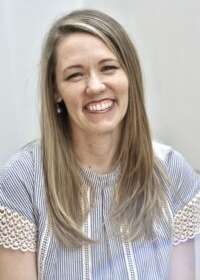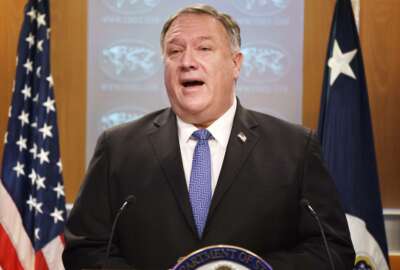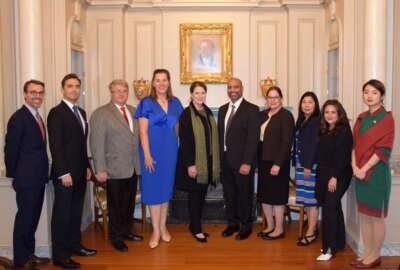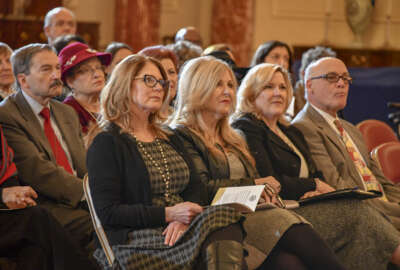‘Model diplomats’: State Dept. honors Foreign Service families’ volunteer work overseas
Ambassadors and diplomats aren’t the only ones who further the mission of the State Department’s Foreign Service.
Ambassadors and diplomats aren’t the only ones who further the mission of the State Department’s Foreign Service.
In most cases, the family members who join them overseas promote the department’s interests through volunteer work.
In recognition of this work, the department last week joined the Associates of the American Foreign Service Worldwide (AAFSW) holding a ceremony for winners of the Secretary of State’s Award for Outstanding Volunteerism Abroad.
The SOSA Awards typically recognize the spouses or children of those who work in the Foreign Service and accompany them on official travel. The Foreign Service officially refers to them as Eligible Family Members (EFMs).
This year’s honorees donated reusable hygiene kits to young women in India and Kenya, combatted human trafficking in the Middle East and fast-tracked the vaccination of U.S. diplomatic personnel in Jordan.
Secretary of State Antony Blinken, in a video message last Thursday, thanked the awardees for serving as “model diplomats.”
“Their efforts show that diplomacy doesn’t only happen in official meetings, negotiations and other more conventional engagements, but in all the ways we engage with people in the places where we serve,” Blinken said. “Even the smallest interaction is a chance to practice the principles we preach — to treat people in a way that recognizes their fundamental dignity.”
AAFSW President Lara Center said this year’s awards honored EFMs whose achievements made just as much of an impact as the work done within the walls of U.S. diplomatic missions.
“They are out there showing the world the American spirit of volunteerism,” Center said.

Layla Murphy and Sari Heidenreich received two of this year’s SOSA awards for their work with the Dutch nonprofit DO BOLD, which combats human trafficking and labor exploitation.
Through their combined efforts, Murphy and Heidenreich assisted more than 200 domestic workers from Sierra Leone living in Oman.
Murphy, in accepting the award, told the story of one woman who accepted a job from recruiters who promised $500 a month working in a supermarket.
In reality, however, the woman became a family’s live-in worker, earning no pay and working from 5 a.m. to 11 p.m. every day.
Murphy, in an interview, said she sought out this work because, growing up in a Foreign Service family, she came to know many domestic workers and migrant workers.
“There are certain positions in the Foreign Service where if you’re [deputy chief of Mission] you have a cook, you have a driver and you have all these others things. And so those are people who become very, very intimate parts of your family,” Murphy said.
The State Department and AAFSW also gave out four honorable mention awards. One went to a volunteer task force at the U.S. Embassy in Amman, Jordan, which got more than 1,000 COVID-19 shots in arms in less than two days.
Foreign Service Officer Mark Matthews, who accepted the award on behalf of the task force, said that over the course of three days, the task force stood up a drive-through mass vaccination clinic in the embassy’s parking lot. They inoculated more than 1,500 people.
“It was that spirit of just cooperation, and people doing the job that needed to be done that — really helped us get this done in a quick and efficient fashion,” Matthews said.
Before the vaccination effort, Matthews said the embassy was managing about 20 to 30 active COVID infections at any one time. After the task force’s campaign, the embassy only had about two or three at a time.
“Our whole goal was just to kind of create that bubble, to make sure that everybody who came to work on a regular basis was vaccinated and protected,” Matthews said.

Jennie Linton, an EFM, also received an honorable mention for creating a branch of an organization called Days for Girls International, which serves women in developing countries who do not have access to menstrual hygiene products.
Linton brought together a community of volunteers from Foreign Service families and American expats living in China.
Linton included her four daughters in the work of assembling these kits, which was common. She said about a third of the participants were children between the ages of eight and 18.
“One of the things that we were hoping that we could accomplish in the Foreign Service is helping our children be able to represent America abroad, but also to be able to serve in the host countries that we live in and be aware of life on many different levels,” Linton said.
While the SOSA Awards honor Foreign Service families for giving back to the communities in which they’re stationed, the State Department also recognized the awardees for their sacrifices.
Brian McKeon, deputy secretary of State for Management and Resources, said EFMs often face unique challenges when uprooted from their lives and careers in the United States.
“The Foreign Service is a family business. You choose your spouse, but you don’t always choose where you go, because your spouse is making these choices or the department is. And so you have to create a new life with your spouse or partner, for you and your family everywhere you go — adjusting to a new culture, new language, new city, new colleagues. It’s a significant sacrifice. I think that’s under-appreciated, probably even within the department for people who don’t do it,” McKeon said.
Linton hosts a podcast called “Expat Mom” that walks listeners through the challenges of Foreign Service life. Linton said topics include addressing loneliness, dealing with a lack of social structure and navigating relationships with family.
“It’s really a blessing to be able to offer some of the tools that our family has learned, and that I have learned in my research and training, to families who maybe are starting out or who are midway and still feeling really frustrated. I think it’s an amazing life, but I think there are tools that can help make it better,” Linton said.
Growing up in a Foreign Service family and living in 11 countries, Murphy said her family always felt embedded in the countries where they lived.
She said her mom, a doctor, would provide medical volunteer work, as well as host holiday parties and fundraisers for local orphanages. That work, she said, felt as much a part of the diplomatic mission as her dad’s work in the Foreign Service.
“I don’t really separate the two. I think that if the mission of being diplomats is to go out into the world, and engage with issues in other countries, then it follows pretty naturally that we would be doing volunteer work. And I think for EFMs especially, because of how embedded you are in the community, it feels more like a duty to your own community,” Murphy said.
Copyright © 2024 Federal News Network. All rights reserved. This website is not intended for users located within the European Economic Area.
Jory Heckman is a reporter at Federal News Network covering U.S. Postal Service, IRS, big data and technology issues.
Follow @jheckmanWFED






